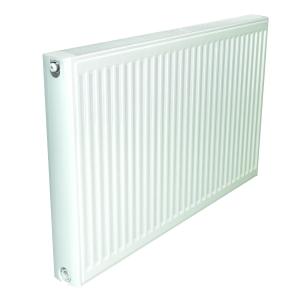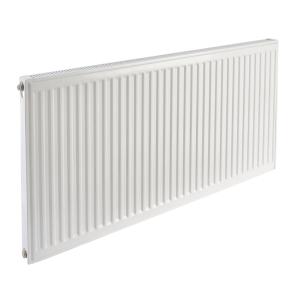Your basket is currently empty!
Written by
Radiator Sizing Calculator – What size radiator do I need?


The size of the radiator you need depends on a few factors such as the size of the room, the number of windows, the level of insulation, and the desired temperature.
When measuring up, a good rule of thumb is to estimate the required heat output in BTUs (British Thermal Units) or watts for the room and select a radiator that can deliver that amount of heat output.
Before we get into radiator sizing though, let’s see how a radiator works with central heating so you can understand why we work it out as we do:
Get the best quotes for boiler installation online in under 1 minute now
New Gas Boilers with FREE Hive Mini Smart Thermostat!
£0 Deposit & 0% Interest Finance available
How does a radiator work?
In most central heating systems in the UK, radiators use hot water or steam to transfer heat to the metal of the radiator, which then emits thermal radiation and heats up the surrounding air in a room.

This is achieved through a central heating system, where a gas boiler heats water to around 60 degrees which then flows through pipes to radiators located throughout the house.
The heated water enters the radiator and releases heat to the surrounding air as it passes through the radiator’s internal pipes or panels (this is the important bit). The warm air circulates around the room, while cooler air is drawn into the radiator to be heated in turn and is why getting the right size radiator is so important.
How to calculate radiator size
To estimate the heat output required for a room, you can use an online BTU calculator or consult with a heating engineer. Once you have an estimate, you can refer to a radiator sizing guide or consult with a heating expert to select a radiator that can deliver the required heat output.
It’s worth noting that it’s better to choose a slightly larger radiator than one that is too small because an undersized radiator will have to work harder to heat the room and may result in higher energy bills. If you have a thermostatic radiator valve however, this can help to keep bills down. Check out our guide on the best thermostatic radiator valves if you need to purchase one.
Radiator sizing calculator
To calculate the size of radiator you need for your room, you can follow these steps:
- Measure the length, width, and height of your room in meters. Multiply these three numbers together to calculate the room’s volume in cubic meters.
- Determine the required temperature for the room. The ideal temperature for a living room is around 21°C, while bedrooms can be slightly cooler at around 18°C.
- Calculate the BTUs (British Thermal Units) required to heat the room by multiplying the room’s volume in cubic meters by a factor that depends on the level of insulation, the number of windows, and the desired temperature. For example, for a well-insulated room with double-glazed windows and a desired temperature of 21°C, you would multiply the room’s volume by 50. If the room has poor insulation or single-glazed windows, you would use a higher factor, such as 70 or 80.
- Convert the calculated BTUs to watts by multiplying the result by 0.2931, which is the conversion factor between BTUs and watts.
- Once you have the required heat output in watts, you can use a radiator sizing guide to select a radiator that can deliver that amount of heat output.
Alternatively, you can use an online radiator sizing calculator that takes into account the room’s dimensions, insulation, and other factors to recommend the appropriate size radiator for your needs.
Im getting a new boiler, should I get new radiators?
If you are planning on getting a new boiler, replacing radiators would only be a good idea if they are old and inefficient. If you are getting a new A-rated boiler to keep bills down then it could be beneficial and cost-effective to get new radiators in the long run.
Written by
Get the best quotes for boiler installation online in under 1 minute now
New Gas Boilers with FREE Hive Mini Smart Thermostat!
£0 Deposit & 0% Interest Finance available





